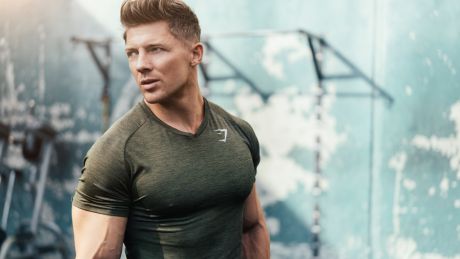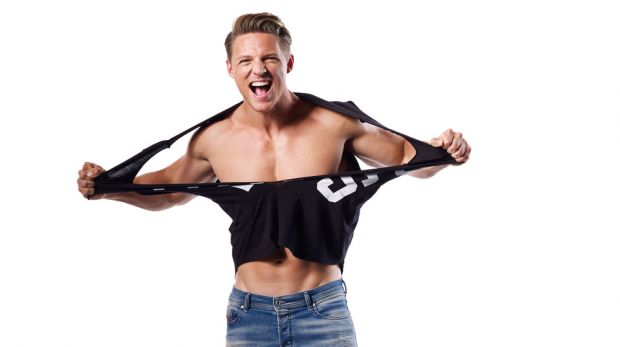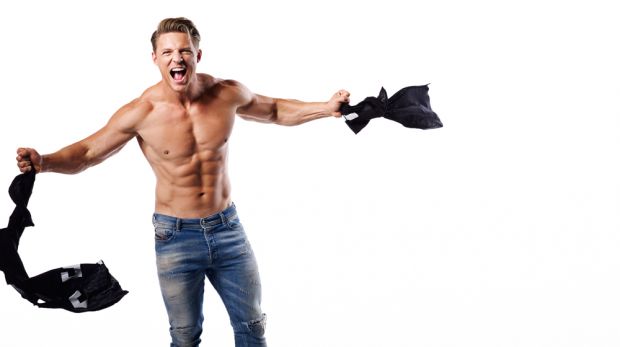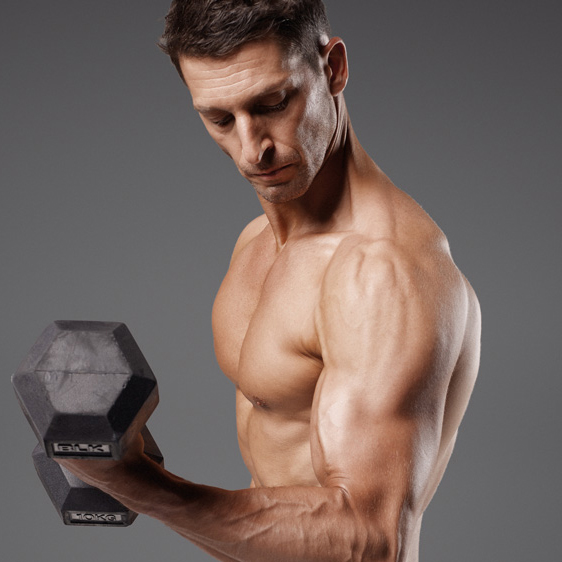Steve Cook Interview: King Of Covers
The mega fitness model has one simple message – don’t give up

When ranking the world’s most popular fitness models, no-one comes close to Steve Cook. The 33-year-old fitness model, presenter and influencer from Idaho has been on the cover of more magazines than he can remember, and his YouTube channel boasts 1.1 million subscribers while he has more than two million followers on Instagram. If you’ve ever been serious about building a better body, at some point you will have stumbled across Cook’s content. When he was last on the cover of Men’s Fitness two years ago, he told us it was his mission to make the world a fitter and healthier place – and he’s showing no signs of slowing down.
It’s been two years since your last Men’s Fitness cover. What have you been up to?
I opened a gym in St George, Utah. It’s a small town where I played college football. We’re using it to film my YouTube videos and it’s going great! I took a break from posting videos for a while – I’ve been doing it for so long, and I only ever want to do something if I am really passionate about it. I’ve never seen the point of doing something for its own sake. So I took some time out, worked out some personal stuff, travelled around the world with Gymshark [the athleisure brand for which Cook is a global ambassador]. Now I am back home and back posting more videos on social media to help educate as many people as possible.
Do you feel pressure to be genuine and influence people in the right way?
People pick up if you’re posting something you’re not passionate about. It’s so obvious you’re just going through the motions. And if I am passionate then that’s going to help spark someone else’s passion too. I think all influencers want to create something that can outlast them – we all have a shelf life and want to be useful and relevant to people for as long as possible.
Are you still as passionate as ever about training?
There’s part of me that always wants to maintain a certain look, which means a certain level of muscle and body fat level, but I also want to be able to perform, whether that’s powerlifting, or CrossFit, or Tough Mudders, or Spartan Races. My approach to training is very much a hybrid one. I don’t want to specialise, because I want to be big and lean and able to lift or run. It’s more important to me to be able to do all those things when I need or want to than just to look a certain way. Fitness is a huge field, and there’s many different activities that fall under that umbrella.
You’ve competed in numerous bodybuilding contests over your career, but that’s taken a back seat recently – do you think you’ll ever step on stage again in a bodybuilding show?
Sometimes I get that itch to step on the stage again – it usually happens around Mr Olympia in Vegas, because it’s so hard to not get caught up in the atmosphere – but right now it’s not a priority. I’ll never say never, but I also will never force myself to do something if the passion and excitement isn’t there.
What do you do differently now in the gym compared with when you were younger?
Like a lot of young men, I wanted to get as big as possible and smash personal bests every time I stepped into the gym. Now the focus is less on getting massive or squatting 500lb. Instead I focus more on recovery, so I do more yoga or Pilates sessions. Why? Because I want to have longevity. That’s more important than sheer muscular size. Also, trying to get as big or strong as possible will mean you’re amped up most of the time – but I want my training to help calm me down, not always amp me up. This is especially true in your 30s when training can be way to get a mental escape rather than just a physical health thing.
So have your goals changed?
You have to get smarter as you get older, but you still have to chase progress. It’s just that what progress looks like changes. It’s not about squat or bench one-rep maxes, but how mobile am I? Is my flexibility improving? Can I fit in a yoga class this week? That’s the kind of progress I’m chasing these days.
Sign up for workout ideas, training advice, reviews of the latest gear and more.
What advice would you go back and give yourself when you first starting out in fitness?
Not to be afraid to try things that might fail. I was told very early on that no-one makes any money out of fitness modelling, but I saw the potential of YouTube and Facebook and Instagram from the start. I took some chances, but I wish I’d taken more risks and backed myself to make them work. You don’t want to look back and regret not chasing your goal. After all, you learn so much from your failures and setbacks, and that knowledge will always be of benefit down the road. Follow your heart, even when the stakes are high and it’s scary, and jump in head first.
Where do most men go wrong when trying to make big improvements to their physiques or performance?
The first is that a lot of people never set a clear goal. You have to have a goal and it has to be realistic – without that, you’re setting yourself up to fail. The second is that even when people do set a goal and start out strong, they don’t plan for the speed bumps that inevitably crop up. After two or three weeks it can get tough to keep doing everything right, so a night out can be tempting. And when you beat yourself up or throw in the towel after one minor setback, that’s when it can all unravel quickly. But it doesn’t have to! Get back on it straight away. Even if you’ve got a hangover, do a quick or easy workout – because doing something is always better than doing nothing. Results don’t come fast and you’ll always get to where you want to be – so long as you don’t give up.
Steve Cook 2016 Interview: Getting It Off His Chest
Steve Cook is the world’s number one fitness model and has inspired millions to get into the shape of their life. But he won’t be satisfied until everyone gets the message that real success comes by loving what you do and having the desire to do better today than you did yesterday. Get that right, he tells Coach’s sister title Men’s Fitness, and the six-pack will take care of itself.
After his Men’s Fitness cover shoot, Steve Cook tweeted to say he would be at St Paul’s Cathedral the following morning at 11am if anyone wanted to do some sightseeing with him. His followers turned up in droves. The 31-year-old from Boise, Idaho, didn’t see many sights in the end because he spent the rest of the morning talking fitness and posing for selfies with his fans.
To say that Cook is the most popular man in fitness is no understatement. He has more than 1.2 million Instagram followers, 600,000 subscribers to his YouTube channel, and every event he attends – whether it’s the world’s biggest fitness show or an informal weekend meet-up – brings people from miles around for the chance to speak to their idol.
But what he tells them isn’t necessarily what you’d expect. With so many self-proclaimed fitness experts on social media banging the drum about how you should smash yourself in the gym every day – hashtagging every post with #BeastMode or something equally hardcore – Cook’s message is loud and clear: health comes first. After all, he says, what’s the point of having a rock-hard six-pack if you go to bed every night starving and miserable and dreading the 6am alarm to go to the gym? For Cook, as it should be for us all, his fitness isn’t defined by his body-fat percentage, nor is his happiness measured by the circumference of his biceps.
Cook’s ethos is simple: to be healthy you have to be happy, and he’s a man on a mission to spread that message far and wide.

Steve, you started out as a pure bodybuilder, but over recent years you’ve branched out into many other areas of training. Why?
I decided about two years ago that I was done with competing [in bodybuilding shows]. I could see major holes in the way bodybuilders were training. Most of them use improper form and they’re not looking at movement patterns.
I realised that the [bodybuilding] industry was and is behind the times – they’re not using mobility and not getting the greatest value out of it. They’re not doing stretching, yoga, incorporating Olympic lifting. I think it could be done in a way that all works together. That’s my goal.
That’s why I’m doing triathlons and half marathons, to show people you can be big, strong and athletic. You don’t have to train like a bodybuilder just because all the old-school bodybuilding magazines tell you to.
What did you learn from competing?
I competed a lot and really got my name out there, but I also learned that as I got more into bodybuilding I was actually becoming less and less healthy. I wasn’t flexible. I wasn’t in a good place mentally either. You get this idea you have to look perfect and that you need to look like you do on stage all year round, which is just not the case.
It’s much better to concentrate on the performance in the gym and the looks will take care of themselves. For me to do a show I needed to concentrate on every little detail, literally everything.
But now year-round I concentrate on trying to improve my squat or my power clean, or my half marathon time or triathlon time. I’m constantly pushing myself to find new ways of getting fit because it’s a better way for me to stay in shape.
Are you concerned that too many people are too focused on the way they look, and don’t pay enough attention to how they feel?
Yeah. I realised if you obsess about how you look you have no balance in your life. You’re placing unrealistic expectations on yourself and when you do that you’re going to end up unhappy and never satisfied with what you have.
I now focus on performance and my goals are what I can see on paper, not in the mirror. I’m at a point where I’m happy with the size I’m at and I’m trying to push myself in other ways, like improving my cardio fitness with swimming which is killer because it’s all about breathing. When you’re in the gym you’re pushing and tensing and flexing, and being fluid is the opposite. That balance has been great.
You’ve got a huge following on social media and people travel miles to see you. Why do you think your message resonates with so many people?
I’m about people being healthy and what I love most is when someone comes up to me and says, “Steve, you helped me lose 20kg” or, “Because of you I started to do this and now I have confidence”. I’ve been that person who felt I had nothing. My message is telling people that if I did it, then they can do it too. Hopefully they can see what I do and what I’m about and use that motivation to start something themselves.
So many people see exercise as a chore or a means to an end. How can people switch that mindset to a positive one?
Think about being happy today. So many people say “I’ll be happy when I hit my goal” or when they lose a certain amount of weight. Actually it’s about learning to be happy today but not content where you’re at.
If I could change anything it’d be to change people’s minds about training and having fun with it. Learn to do new things. Find a way to have better life balance.
Why is that so important to you?
I’ve know a lot of people who’ve struggled with addiction, including two of my friends – one committed suicide and one overdosed. I played college [American] football with them and they both passed away about five months ago. One thing I want to do is find people who are struggling and get those people to realise they can make positive changes to your life through the gym or through exercise.
We need to learn to be happy in ourselves and not look at what other people have whether that’s cars or money or fame. We should never say that we’ll be happy when we have that person’s life. You need to be happy today, happy now. For me it’s about trying to get people to appreciate how important that outlook is.

How have you changed physically since embracing a more rounded approach to training?
Now I’m stronger. I might not be stage-ready right now but what I found was I used to bulk up, I’d get really lean for a show and I’d win – I won nine out of my first ten shows – and it was cool but it was the same thing: diet down to this extreme level, do your stepping on the treadmill, over and over again.
I wasn’t doing it because I enjoyed it any more – I was doing it because I needed to better the results I’d always had. And it got really old. I decided to do a Tough Mudder and a half marathon in Saint George, Utah.
How did you get on?
It was all right. My goal was under two hours and I did an hour and 54 minutes – not bad when I weighed 215lb [97.5kg]. For me I needed a goal.
Next I did Olympic lifting which I liked, did CrossFit for a little while but didn’t love it. I liked Olympic lifting, and I like gymnastics and calisthenics, but I don’t necessarily think CrossFit is the best way to go in terms of programming. Elements of it are great. It’s a sport, though, and in sports there’s always a risk of injury. When you’re doing stuff that has a high degree of difficulty, like Olympic lifts, under stress and for time there’s a good chance of getting hurt eventually. But I tried it and I love aspects of it.
Has there always been an athlete under your bodybuilding exterior?
I always played sports growing up. I played baseball, basketball, football and track. I wrestled to eighth grade [around age 14]. My dad was a high school athletics director so that probably played a part but sports was just something I did.
I got into bodybuilding when I was playing college football – I’d go back later at night and do arm curls and stuff like that because I loved both. After that I got married, then got divorced, and the thing that got me [mentally] back on track was having a goal to work towards and that goal was a bodybuilding show.
How old were you?
I was 23. Yep, I was young! I got married at 21. After the divorce I hadn’t finished my degree so I moved back to my college to study. I was a biology/psychology major and my whole senior paper was on how exercise affects college students. Not just physically but also in classroom performance.
While I was doing that I was prepping for one of my very first shows, a male model search. There were 300 guys that entered. It was the first time the event had been held and it was in Las Vegas at the Mr Olympia contest. I won and part of the prize was a magazine cover and it launched my career.
Will you ever compete in a bodybuilding show again?
I might get back on stage but I’m going to have fun with it. If it’s not adding value to my life I’m not going to do it. Every fitness thing you do should make you feel better. You should always feel better after working out.
I got to the point when I was just going through the motions – doing it because I felt I had to. I wasn’t enjoying it and I didn’t have any balance, and that kind of manifested in that I would cheat on my diet and it became very unhealthy. Now I don’t diet. I eat and train, I don’t diet and exercise.
That explains the doughnut you just ate…
Ha! Exactly. It’s about balance. For example, today people brought doughnuts. If that had been a couple of years ago when I was in my bodybuilding mindframe, the whole day would have been a wreck because I had that one doughnut. I would have binged the rest of the day, eaten myself sick because I messed up.
Now I realise you’ve got to have balance. It’s OK to eat a doughnut. I’m training, I’m working hard, it’s OK.
Do you count calories?
I don’t count [but] I have a rough idea of what’s in things. With protein I try to hit about 250g a day. I’m carb cycling now so on days I’m active I’ll be on 300g of carbs, days I’m less active I’ll be at about 200g. With fats I shoot for about 80g – a little higher than in my bodybuilding days, but fats are so important for hormone balance and staying healthy. I’m doing so much more cardio now that I’m actually getting leaner on those macros so I might have to bump them up.
I heard you were lactose intolerant. How does that affect your diet?
I’ve never actually been assessed – I just feel I get bubble guts with milk, so I have almond milk. Don’t get me wrong, if there’s a good ice cream I’m going to have it and pay the price! With supplements I have hydrolysed whey protein that’s really low in lactose. My stomach is a lot happier with me on things that are low lactose.
How about booze? Do you drink?
I did last night! That’s because I was out with the Optimum Nutrition [Cook is an ambassador for the sports nutrition brand] guys to celebrate their 30th birthday. But I never drink at home. So maybe once a month I drink. There’s been occasions when I’m out on the road travelling and there’s events… but fortunately for me I don’t crave it.
Does it affect your social life?
I dated a girl who loved a glass of wine. That’s fine but for me I’d rather splurge on pizza or something, use my calories differently. If it gets to a point when you can’t get up the next morning and work out… I never want to be that way. My happiness comes from my body feeling good so if something starts interfering with that then it’s too much.

You travel almost constantly. How do you keep in shape when you’re on the go all the time?
I make training the first thing I do in the day. The longest I’ll be at home is two or three weeks – I’m on the go constantly. If I try to work out after an expo it doesn’t happen. I need the morning to get up, meditate, stretch, train, eat a good breakfast, start the day. If I get all that out the way I know the things that matter the most to me, my body, is taken care of.
When you’re on the road what’s the one piece of gym kit you won’t travel without?
I always take my running shoes and Nike Met Cons for training. If I can fit it in my bag I’ll always take a foam roller and a massage ball, and then my supplements.
What’s the most effective way you’ve found to train your chest?
I do one major day and I’ll hit it again later in the week with two movements. Incline dumbbell presses are the best for the pecs. Developing a big chest is all about angles. You can be on the bench press and only really be working your anterior deltoids and triceps. A lot of it is checking your ego and using your back. You’ve got to activate your lats so keep your shoulders back, a little arch under your back, and your feet flat on the floor.
You’re an inspiration to many, but who was your inspiration growing up?
Rob Dyrdek, the skateboarder. He created something – he started out sponsored by DC and now he has his own empire. He had a vision of what he wanted and through sheer passion and enthusiasm he created it.
Also Tony Robbins, the motivational speaker. Check him out on Netflix – he’s a big guy, 6ft 5in, big booming voice. He’s written some best-selling books and he just changes people and understands people. He really cares about people – he gets it, and people love being around him. If I could be a balance of those two people and do it through fitness… that’s my lifelong goal.
Steve Cook is an Optimum Nutrition sponsored athlete. Find out more about Optimum Nutrition at onacademy.co.uk

Joe Warner is a highly experienced journalist and editor who began working in fitness media in 2008. He has featured on the cover of Men’s Fitness UK twice and has co-authored Amazon best-sellers including 12-Week Body Plan. He was the editor of Men’s Fitness UK magazine between 2016 and 2019, when that title shared a website with Coach.
